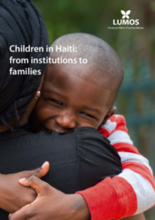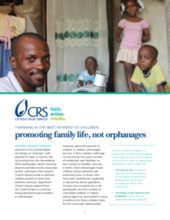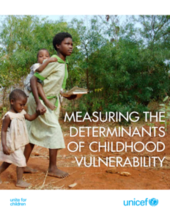childrens_living_arrangement
children_living_without_bio
Displaying 61 - 70 of 94
This report is an analysis of the overall findings from the research project on Haitian child domestic workers.
Lumos is an international organisation working to end the institutionalisation of children globally.
This video reveals the adverse conditions in the many unregistered orphanages in Haiti
This report from SBS World News Radio highlights recent changes to Haiti’s adoption system in response to increased dangers of child trafficking and exploitation since the 2010 earthquake.
This report, first distributed at the seminar co-hosted by Lumos and USAID on the challenge of institutionalization in Haiti, provides some background information on the effects of institutionalisation as well as the particular situation in Haiti.
This document, published by Catholic Relief Services, urges members of the Catholic faith community to consider the best interests of the child when partnering, or “twinning” with parishes in Haiti and undertaking charitable activities.
This study by UNICEF sought to identify key determinants of vulnerability among children –including those affected by HIV and AIDS – that can contribute to developing an improved global measure of vulnerable children in the context of HIV and AIDS. Data from the most recent available household surveys at the time of analysis was used from 11 countries – Cambodia, Central African Republic, Haiti, Malawi, Rwanda, Sierra Leone, Swaziland, Uganda, United Republic of Tanzania, Zambia and Zimbabwe – were pooled.
Le phénomène des restavek (enfants qui « restent avec » une famille qui n’est pas la leur) a longtemps ete méconnu du public. Pourtant, entre 150 000 et 500 000 enfants haïtiens vivent ce calvaire.
Charts that accompany the article Orphan Fever: The Evangelical Movement’s Adoption Obsession, illustrating the trends in international adoptions from Liberia, Kyrgyzstan, Ethiopia, Uganda, and Haiti to families in the United States.
Selon l'UNICEF et l'Institut du bien-être social et de recherche environ 80% des enfants qui se trouvent dans les orphelinats en Haiti ont un parent proche. Ces enfants sont le plus souvent abandonnés par leur famille parce que celles-ci manquent de moyens pour subvenir à leurs besoins, selon l'UNICEF qui attribue ce problème à l'extrême vulnérabilité de ces enfants en Haïti.



